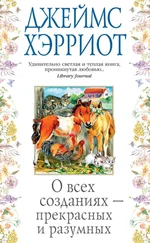Джеймс Хэрриот - All Creatures Great and Small
Здесь есть возможность читать онлайн «Джеймс Хэрриот - All Creatures Great and Small» весь текст электронной книги совершенно бесплатно (целиком полную версию без сокращений). В некоторых случаях можно слушать аудио, скачать через торрент в формате fb2 и присутствует краткое содержание. Год выпуска: 2011, ISBN: 2011, Издательство: Open Road Media, Жанр: Домашние животные, на английском языке. Описание произведения, (предисловие) а так же отзывы посетителей доступны на портале библиотеки ЛибКат.
- Название:All Creatures Great and Small
- Автор:
- Издательство:Open Road Media
- Жанр:
- Год:2011
- ISBN:9781453234488
- Рейтинг книги:4.33 / 5. Голосов: 3
-
Избранное:Добавить в избранное
- Отзывы:
-
Ваша оценка:
- 80
- 1
- 2
- 3
- 4
- 5
All Creatures Great and Small: краткое содержание, описание и аннотация
Предлагаем к чтению аннотацию, описание, краткое содержание или предисловие (зависит от того, что написал сам автор книги «All Creatures Great and Small»). Если вы не нашли необходимую информацию о книге — напишите в комментариях, мы постараемся отыскать её.
All Creatures Great and Small — читать онлайн бесплатно полную книгу (весь текст) целиком
Ниже представлен текст книги, разбитый по страницам. Система сохранения места последней прочитанной страницы, позволяет с удобством читать онлайн бесплатно книгу «All Creatures Great and Small», без необходимости каждый раз заново искать на чём Вы остановились. Поставьте закладку, и сможете в любой момент перейти на страницу, на которой закончили чтение.
Интервал:
Закладка:
It was said in the pubs that Jeff was one of the richest men in the town but the locals, as they supped their beer, had to admit that he earned his money. At any hour of the day or night he would rattle out into the country in his ramshackle lorry, winch on a carcass, bring it back to the yard and cut it up. A dog food dealer came twice a week from Brawton with a van and bought the fresh meat. The rest of the stuff Jeff shovelled into his boiler to make the meat meal which was in great demand for mixing in pig and poultry rations. The bones went for making fertiliser, the hides to the tanner and the nameless odds and ends were collected by a wild-eyed individual known only as the “ket feller.” Sometimes, for a bit of variety, Jeff would make long slabs of strange-smelling soap which found a brisk sale for scrubbing shop floors. Yes, people said, there was no doubt Jeff did all right. But, by gaw, he earned it.
My contacts with Mallock were fairly frequent. A knacker’s yard had a useful function for a vet. It served as a crude post-mortem room, a place where he could check on his diagnosis in fatal cases; and on the occasions where he had been completely baffled, the mysteries would be revealed under Jeff’s knife.
Often, of course, farmers would send in an animal which I had been treating and ask Jeff to tell them “what had been wrong wi’t” and this was where a certain amount of friction arose. Because Jeff was placed in a position of power and seldom resisted the temptation to wield it. Although he could neither read nor write, he was a man of great professional pride; he didn’t like to be called a knacker man but preferred “fell-monger.” He considered in his heart that, after twenty-odd years of cutting up diseased animals, he knew more than any vet alive, and it made things rather awkward that the farming community unhesitatingly agreed with him.
It never failed to spoil my day if a farmer called in at the surgery and told me that, once more, Jeff Mallock had confounded my diagnosis. “Hey, remember that cow you were treating for magnesium deficiency? She never did no good and ah sent ’er into Mallock’s. Well, you know what was really the matter wi’ ’er? Worm i’ the tail. Jeff said if you’d nobbut cut tail off, that cow would have gotten up and walked away.” It was no good arguing or saying there was no such thing as worm in the tail. Jeff knew—that was all about it.
If only Jeff had taken his priceless opportunities to acquire a commonsense knowledge it wouldn’t have been so bad. But instead, he had built up a weird pathology of his own and backed it up by black magic remedies gleaned from his contacts with the more primitive members of the farming community. His four stock diseases were Stagnation of t’lungs, Black Rot, Gastric Ulsters and Golf Stones. It was a quartet which made the vets tremble for miles around.
Another cross which the vets had to bear was his unique gift of being able to take one look at a dead animal on a farm and pronounce immediately on the cause of death. The farmers, awestruck by his powers, were always asking me why I couldn’t do it. But I was unable to dislike the man. He would have had to be more than human to resist the chance to be important and there was no malice in his actions. Still, it made things uncomfortable at times and I liked to be on the spot myself whenever possible. Especially when Isaac Cranford was involved.
Cranford was a hard man, a man who had cast his life in a mould of iron austerity. A sharp bargainer, a win-at-all-cost character and, in a region where thrift was general, he was noted for meanness. He farmed some of the best land in the lower Dale, his shorthorns won prizes regularly at the shows but he was nobody’s friend. Mr. Bateson, his neighbour to the north, summed it up: “That feller ’ud skin a flea for its hide.” Mr. Dickon, his neighbour to the south, put it differently: “If he gets haud on a pound note, by gaw it’s a prisoner.”
This morning’s meeting had had its origin the previous day. A phone call mid afternoon from Mr. Cranford. “I’ve had a cow struck by lightning. She’s laid dead in the field.”
I was surprised. “Lightning? Are you sure? We haven’t had a storm today.”
“Maybe you haven’t, but we have ’ere.”
“Mmm, all right, I’ll come and have a look at her.”
Driving to the farm, I couldn’t work up much enthusiasm for the impending interview. This lightning business could be a bit of a headache. All farmers were insured against lightning stroke—it was usually part of their fire policy—and after a severe thunderstorm it was common enough for the vets’ phones to start ringing with requests to examine dead beasts.
The insurance companies were reasonable about it. If they received a certificate from the vet that he believed lightning to be the cause of death they would usually pay up without fuss. In cases of doubt they would ask for a post mortem or a second opinion from another practitioner. The difficulty was that there are no diagnostic post-mortem features to go on; occasionally a bruising of the tissues under the skin, but very little else. The happiest situation was when the beast was found with the tell-tale scorch marks running from an ear down the leg to earth into the ground. Often the animal would be found under a tree which itself had obviously been blasted and torn by lightning. Diagnosis was easy then.
Ninety-nine per cent of the farmers were looking only for a square deal and if their vet found some other clear cause of death they would accept his verdict philosophically. But the odd one could be very difficult.
I had heard Siegfried tell of one old chap who had called him out to verify a lightning death. The long scorch marks on the carcass were absolutely classical and Siegfried, viewing them, had been almost lyrical. “Beautiful, Charlie, beautiful, I’ve never seen more typical marks. But there’s just one thing.” He put an arm round the old man’s shoulder. “What a great pity you let the candle grease fall on the skin.”
The old man looked closer and thumped a fist into his palm. “Dang it, you’re right, maister! Ah’ve mucked t’job up. And ah took pains ower it an’ all—been on for dang near an hour.” He walked away muttering. He showed no embarrassment, only disgust at his own technological shortcomings.
But this, I thought, as the stone walls flipped past the car windows, would be very different. Cranford was in the habit of getting his own way, right or wrong, and if he didn’t get it today there would be trouble.
I drove through the farm gate and along a neat tarmac road across the single field. Mr. Cranford was standing motionless in the middle of the yard and I was struck, not for the first time, by the man’s resemblance to a big, hungry bird. The hunched, narrow shoulders, the forward-thrust, sharp-beaked face, the dark overcoat hanging loosely on the bony frame. I wouldn’t have been surprised if he had spread his wings and flapped his way on to the byre roof. Instead, he nodded impatiently at me and began to hasten with short, tripping steps to a field at the back of the house.
It was a large field and the dead cow lay almost in the centre. There were no trees, no hedges, not even a small bush. My hopeful picture of the body under a stricken tree melted immediately, leaving an anxious void.
We stopped beside the cow and Mr. Cranford was the first to speak. “Bound to be lightning. Can’t be owt else. Nasty storm, then this good beast dropping down dead.”
I looked at the grass around the big shorthorn. It had been churned and torn out, leaving patches of bare earth. “But it hasn’t exactly dropped down, has it? It died in convulsions—you can see where its feet have kicked out the grass.”
“All right then, it ’ad a convulsion, but it was lightning that caused it.” Mr. Cranford had fierce little eyes and they darted flitting glances at my shirt collar, macintosh belt, Wellingtons. He never could quite bring himself to look anybody in the eye.
Читать дальшеИнтервал:
Закладка:
Похожие книги на «All Creatures Great and Small»
Представляем Вашему вниманию похожие книги на «All Creatures Great and Small» списком для выбора. Мы отобрали схожую по названию и смыслу литературу в надежде предоставить читателям больше вариантов отыскать новые, интересные, ещё непрочитанные произведения.
Обсуждение, отзывы о книге «All Creatures Great and Small» и просто собственные мнения читателей. Оставьте ваши комментарии, напишите, что Вы думаете о произведении, его смысле или главных героях. Укажите что конкретно понравилось, а что нет, и почему Вы так считаете.
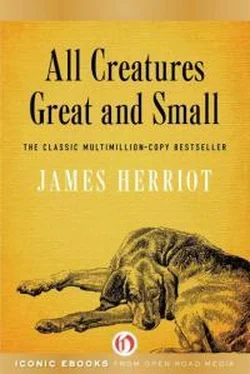
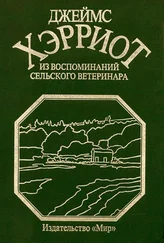
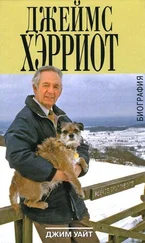
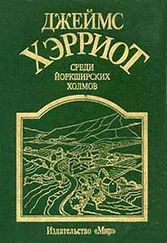
![Джеймс Хэрриот - О всех созданиях – больших и малых [litres]](/books/391169/dzhejms-herriot-o-vseh-sozdaniyah-bolshih-i-malyh-thumb.webp)



